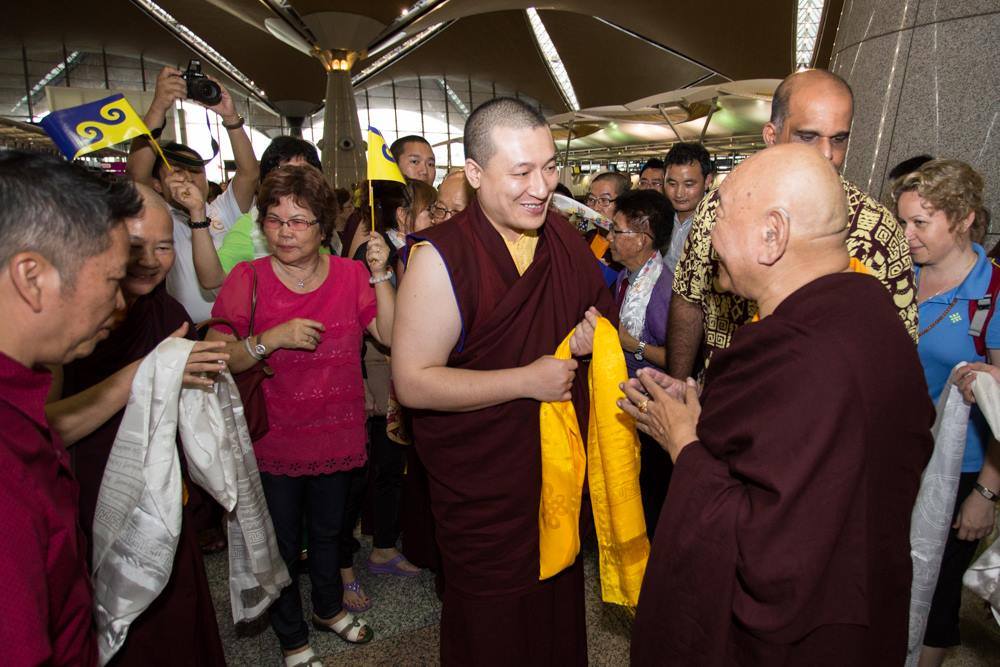
April 28, 2015 2015年4月28日
傳統上當你開始修煉藏傳佛法,你會皈依三寶,並從初步實踐入手。但我個人認為,如果一個人真正從第一步開始,你必須持有這樣的態度–『我想成為有修養的人,我想發掘我的內在財富。』你可以從這基礎跟隨傳統上提供的修行方法。
Traditionally, when you begin Tibetan Buddhist practice, you take refuge in the Three Jewels, and start with the preliminary practices. But personally, I feel that if one is truly starting from step one, you must first have this attitude: ‘I want to be decent. I want to draw from the Inner Wealth within.’ This is the foundation upon which you can then follow the traditional aspects of the practices that are offered.
第一步是反思。知悉這內在財富在你的內心,你可以反思你的心和去嘗試看看是否有與生俱來的意念和明瞭因果,與生俱來的意念去祈願得到真理與和平。如果我們能體驗這些事情,那便是藏傳佛教路上的第一步,非傳統修行的方法。
為培養更多的內在財富,你可以從所有傳統修行開始,基於邏輯和理性來反思問題。
The first step is reflection. Knowing that this Inner Wealth lies inside you, you may reflect on your own consciousness and try to see if there is an innate sense and understanding of cause and effect, an innate sense of aspiring for truth and peace. If we discover these things, then this is already the first non-traditional practice on the Tibetan Buddhist path.
To cultivate this Inner Wealth more, you can then begin with all the traditional practices, reflecting on questions that are grounded in logic and reason.
例如:你希望學習某些事物,你必須跟隨有經驗的人和依照他們的途徑,這是否合乎邏輯?持有偉大、正面的態度是否合乎邏輯?你的思想方面,你的談話方面和你的行為方面是否和修養有關?你的動機比你的行動更為重要?
假若感到這些都是合理和合乎邏輯,那已經是你在體驗自我途中踏上了一步和觸及到你的內在財富。
For example, is it logical that if you want to learn something, you must learn from someone who is experienced, and follow their path? Is it logical to have a great, positive attitude? Is it relevant to have decency, be it in the way you think, the way you talk, and the way you behave? Does intention matter more than what you do?
If all these seem reasonable and logical, then it is already a step on the path to realising more of yourself and tapping into your Inner Wealth.
跟著你可以考核傳統上的修行,例如:小乘、大乘和金剛乘傳統修行,細看每一種能否跟你的邏輯和理論能產生共鳴,正如我剛才提到的問題。通過這方法,你便不會盲目跳進一種生活方式。
Then, you may also examine the traditional aspects of the practice, for example the Theravada, Mahayana and Vajrayana traditional practices, and see if each one resonates with your own logic and reason, like the questions I just mentioned. By doing this, you won’t just blindly jump into a way of life.
否則,如果你沒有從上述事情開始,你或會面對要讓自己去適應全新的東西的問題。跟著感到有點不自然。偶而,或從開始,你或會感到這跟你的本性和原則不一樣 — 你只是在適應。
比喻說你在城市出生及長大,然後住在一個寧靜偏遠的島嶼。你可以很艱苦地嘗試但掙扎去適應。經過一段時間後仍然不容易–開始時不容易,中段時不容易,在最終時也不會容易。因為在每一方面,你感到要適應並非你真本性的事情。
Otherwise, if you don’t do any of these things at the beginning, then you may face the problem of feeling that you have to adapt yourself to something completely new. Then it becomes a little bit unnatural. From time to time, or even from the start, you might have the feeling that it’s not really according to your nature, according to your constitution — you’re just adapting.
Let’s say you are born and raised in the city and then go to live on a quiet, remote island. You could try very hard, but it would be a struggle to adapt. After some time it will still not be easy — it is not easy at the beginning, it won’t be easy in the middle, and it won’t be easy at the end. Because in every aspect, you feel that you have to adapt to something that is not really in accordance with your nature.
如此類推,你或會對此修行引致過敏反應–這並非好事。反而取而代之是採納而不是適應,你要與已存在的內在聯繫。例如,我是西藏人,跟東、西、南或北有種內在的聯繫,只因我是人類。因此,這方面是沒有區別的,所以就這樣,有很多類同的地方,沒有必要去適應的。
So in a similar way, you may have a sort of allergic reaction against the practice – which is not good! So instead, to adopt rather than adapt, you have to relate to it as if there is already an inherent connection. Like for example, I am a Tibetan, but there is an inherent connection with East, West, South or North, simply because I am a human being. So in that way there is no difference at all. And then, just like that, there are so many similar things. There is no need to adapt!
我這樣說是因為我感到有風險或危機,雖是被動的,但這很重要。當一個人的感受會產生:『我是人類,所以我有情感,從而成就我。然而為什麼我要嘗試消除這些情感?如我這樣做,便會成為一台機器。若如靈性修持是如此做法,那麼我真的想追隨靈性修持嗎?』
I am saying this because I think there is a risk or a danger, which is passive but has a lot of weight. It arises when one feels ‘I am a human being, so I have emotions, and that’s who I am. So why do I have to try to actually remove those emotions? If I do that, then I might just become a machine. And if spirituality is meant to do that, then do I really want spirituality?’
雖然這思維的邏輯是正確的,但是被錯誤應用。情感不是你的一部份,它只是一種暫時性的習慣。你並非與生俱來便憤怒,或帶有任何情感。情感會逝去。靈性修持的路上是發掘你的真性,提取你的內在財富。
While the logic of this thinking is correct, it is applied in the wrong way. Emotion is not a part of you, it is just a temporary habit. You are not inherently angry, or inherently any emotion. Emotions pass. The path to spirituality is about discovering your true nature, tapping into your Inner Wealth.
理解了這一點,差不多可否定靈性修持或修行是會改變個人真性的想法。
基於這些原因,反思出我們對修行的動機,邏輯和理據是非傳統修行的重要起步,此後才踏上比較傳統藏傳佛教的道路。
Understanding this point, almost automatically negates the idea that spirituality or practice is a way to alter a person’s true nature.
For these reasons, reflecting on our motivations, logic and reasons for practicing are important non-traditional first steps, before setting out on the more traditional Tibetan Buddhist path.
(原文 Original article: http://www.kibi-edu.org/qa/what-is-a-good-practice-to-start-with-for-people-who-are-new-to-tibetan-buddhism/)
(中文翻譯由本中心翻譯小組負責。若有錯漏,請見諒。節錄或載列文章內容以原文為準。)






